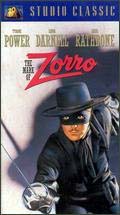The Mark of Zorro
Reviewed by: Brett Willis
CONTRIBUTOR
| Moral Rating: | Better Than Average |
| Moviemaking Quality: |
|
| Primary Audience: | 10 to Adult |
| Genre: | Adventure/Drama |
| Length: | 1 hr. 33 min. |
| Year of Release: | 1940 |
| USA Release: |

| Featuring |
|---|
| Tyrone Power, Linda Darnell, Basil Rathbone, Gale Sondergaard, Eugene Paulette, J. Edward Bromberg, Montagu Love, Janet Beecher |
| Director |
|
Rouben Mamoulian |
| Producer |
| Raymond Griffith, Darryl F. Zanuck |
| Distributor |
Though not the first filmed version of the Zorro story (there’s a 1920 silent version starring Douglas Fairbanks), this is a well-done and enduring one. It’s worth the price of a rental just to see the duel between Zorro and the chief villain.
The time-frame is the early 19th century, when California was a Spanish colony. Don Diego de la Vega (Tyrone Power), the son of the alcalde (mayor) of Los Angeles, has been educated in Spain in the fine arts of killing, and a military commission awaits him. Meanwhile, his reputation as The California Cockerel precedes him and all the young bucks want to cross swords with him (non-lethally) and see how good he really is. But when he receives a message from his father Don Alejandro (Montagu Love) to return to California at once, both the commission and the matches are forgotten.
Arriving in California, he finds a somber atmosphere rather than the gaiety he remembers. His inquiries as to the cause bring evasive answers. When he identifies himself as the son of the alcalde, people clam up and shun him because it’s the alcalde’s tyranny that has made their lives miserable. There’s a lot of “ships passing each other in the night” misunderstanding; it doesn’t occur to either Don Diego or the people he speaks with that they may not be talking about the same person.
Finally the mystery is solved. Don Alejandro was forced out of office by Esteban Pasquale (Basil Rathbone), the ruthless personal guard of the new alcalde, Luis Quintero (J. Edward Bromberg). Quintero is sleazy and unprincipled, but weak; Pasquale is the real power behind the throne. Diego’s father and the rest of the Dons (rich, landed gentry) are upset with the new government, but they respect the rule of law and keep a low profile. The high taxes (a large portion of which are being pocketed by Quintero and Pasquale) are oppressive to the rich, but bearable. Those same taxes are a matter of life and death to the poor. But anyone who speaks up faces retribution, ranging from imprisonment to having his tongue cut out. No question in this story who the bad guys are.
As he meets with and evaluates these two vermin, a plan begins to hatch in Diego’s mind. No one—not even his family—has had intimate contact with him since he began his military training; so if he takes on an alternate personality now and keeps it consistent, he should be able to convince everyone that that false persona is his real self. To Quintero and Pasquale, and later to his own father and mother, he presents himself as disinterested in or revolted by swordplay and all other “manly” pursuits. He’d rather spend time shopping with the women, discussing silks and perfume, and performing magic tricks. His father calls him “worthless”, and the priest (Eugene Paulette) who first taught him the use of a sword calls him a “puppy”. No one calls his fake affectations by their correct name; after all, it’s 1940 and the Hays film codes are in place. But the viewer gets the idea. The purpose of this deceit is, of course, so that Diego can carry on a crusade without being a suspect.
Soon, a masked hero dressed in black, calling himself Zorro (the Fox) and carving a “Z” into any convenient surface, begins a counter-oppression campaign and publicly calls for Quintero’s resignation. While Quintero cowers behind an armed guard, Pasquale does everything he can to root out this new threat to “business as usual.” Things get a little complicated when Diego falls in love with Quintero’s lovely niece Lolita (Linda Darnell). Another priceless scene is the one where Diego, disguised as a priest, awkwardly advises Lolita on marital questions.
Content Warnings: There’s some violence, including the elaborate swordfight scene that ends in death. Also a comic-relief sequence in which the priest repeatedly says “God forgive me” while bopping Pasquale’s soldiers on the head. No overt sexual material or nudity, of course. There’s no profane language in English, but there are expletives such as “Madre de Dios” and “Santa Maria.”
Zorro is one of a select group of “superheros” who have no supernatural powers but have honed their natural powers to perfection, and who wear a mask to strike terror into the hearts of bad guys. That group would also include Batman, The Lone Ranger and The Phantom. The Zorro character is deeply imbedded in our culture and never grows old. Besides several remakes of this film and readaptations of the underlying story, there were: five TV series; the 1998 “sequel” “The Mask of Zorro” starring Anthony Hopkins and Antonio Banderas; spoofs such as Zorro, the Gay Blade starring George Hamilton; and “El Kabong,” the alter ego of cartoon character Quick Draw McGraw. Even the Wal-Mart Happy Face once donned a Zorro mask and used a sword to slash prices.
People are conscious of the need for a Saviour, and there’s a definite Messianic aspect to many superhero stories.



But there’s one outstanding performance in this film, and that’s Basil Rathbone. If you’ve only ever seen him as Sherlock Holmes, you simply MUST see him in action as the sword-wielding villain out for Diego’s blood. The performances are good, and the acting shines particularly in the young female lead.
My only complaint is with the climax. Why on Earth they sped up perfectly good duels in the ’30s remains a mystery. Watch and you’ll probably have the same reaction we did… a good laugh. :)
My Ratings: [Good / 3]